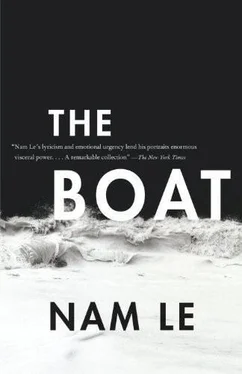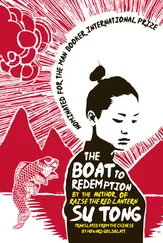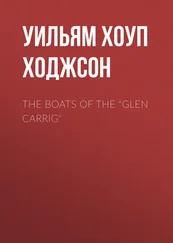His face was pale and fixed in a smile. "Don't worry about me," he said. "I can just meditate. Or read."
"There's a coffee shop downtown," I said. "And a Japanese restaurant." It sounded pathetic. It occurred to me that I knew nothing about what my father did all day.
He kept smiling, looking at the ground moving in front of his feet.
"I have to write," I said.
"You write."
And I could no longer read his smile. He had perfected it during our separation. It was a setting of the lips, sly, almost imperceptible, which I would probably have taken for a sign of senility but for the keenness of his eyes.
"There's an art museum across the river," I said.
"Ah, take me there."
"The museum?"
"No," he said, looking sideways at me. "The river."
We turned back to Burlington Street and walked down the hill to the river. He stopped halfway across the bridge. The water below looked cold and black, slowing in sections as it succumbed to the temperature. Behind us six lanes of cars skidded back and forth across the wet grit of the road, the sound like the shredding of wind.
"Have you heard from your mother?" He stood upright before the railing, his head strangely small above the puffy down jacket I had lent him.
"Every now and then."
He lapsed into formal Vietnamese: "How is the mother of Nam?"
"She is good," I said — too loudly — trying to make myself heard over the groans and clanks of a passing truck.
He was nodding. Behind him, the east bank of the river glowed wanly in the afternoon light. "Come on," I said. We crossed the bridge and walked to a nearby Dairy Queen. When I came out, two coffees in my hands, my father had gone down to the river's edge. Next to him, a bundled-up, bearded figure stooped over a burning gasoline drum. Never had I seen anything like it in Iowa City.
"This is my son," my father said, once I had scrambled down the wet bank. "The writer." I glanced quickly at him but his face gave nothing away. He lifted a hot paper cup out of my hand.
"Would you like some coffee?"
"Thank you, no." The man stood still, watching his knotted hands, palms glowing orange above the rim of the drum. His voice was soft, his clothes heavy with his life. I smelled animals in him, and fuel, and rain.
"I read his story," my father went on in his lilting English, "about Vietnamese boat people." He gazed at the man, straight into his blank, rheumy eyes, then said, as though delivering a punch line, " We are Vietnamese boat people."
We stood there for a long time, the three of us, watching the flames. When I lifted my eyes it was dark.
"Do you have any money on you?" my father asked me in Vietnamese.
"Welcome to America," the man said through his beard. He didn't look up as I closed his fist around the damp bills.
***
MY FATHER WAS DRAWN TO WEAKNESS, even as he tolerated none in me. He was a soldier, he said once, as if that explained everything. With me, he was all proverbs and regulations. No personal phone calls. No female friends. No extracurricular reading. When I was in primary school, he made me draw up a daily ten-hour study timetable for the summer holidays, and punished me when I deviated from it. He knew how to cane me twenty times and leave only one black-red welt, like a brand mark across my buttocks. Afterward, as he rubbed Tiger Balm on the wound, I would cry in anger at myself for crying. Once, when my mother let slip that durian fruit made me vomit, he forced me to eat it in front of guests. Doi an muoi cung ngon . Hunger finds no fault with food. I learned to hate him with a straight face.
When I was fourteen, I discovered that he had been involved in a massacre. Later, I would come across photos and transcripts and books; but that night, at a family friend's party in suburban Melbourne, it was just another story in a circle of drunken men. They sat cross-legged on newspapers around a large blue tarpaulin, getting smashed on cheap beer. It was that time of night when things started to break up against other things. Red faces, raised voices, spilled drinks. We arrived late and the men shuffled around, making room for my father.
"Thanh! Fuck your mother! What took you so long — scared, no? Sit down, sit down — "
"Give him five bottles." The speaker swung around ferociously. "We're letting you off easy, everyone here's had eight, nine already."
For the first time, my father let me stay. I sat on the perimeter of the circle, watching in fascination. A thicket of Vietnamese voices, cursing, toasting, braying about their children, making fun of one man who kept stuttering, "It has the power of f-f-five hundred horses!" Through it all my father laughed good-naturedly, his face so red with drink he looked sunburned. Bowl and chopsticks in his hands, he appeared somewhat childish squashed between two men trading war stories. I watched him as he picked sparingly at the enormous spread of dishes in the middle of the circle. The food was known as do nhau : alcohol food. Massive fatty oysters dipped in salt-pepper-lemon paste. Boiled sea snails the size of pool balls. Southern-style shredded chicken salad, soaked in vinegar and eaten with spotty brown rice crackers. Someone called out my father's name; he had set his chopsticks down and was speaking in a low voice:
"Heavens, the gunships came first, rockets and M60s. You remember that sound, no? Like you were deaf. We were hiding in the bunker underneath the temple, my mother and four sisters and Mrs. Tran, the baker, and some other people. You couldn't hear anything. Then the gunfire stopped and Mrs. Tran told my mother we had to go up to the street. If we stayed there, the Americans would think we were Viet Cong. 'I'm not going any where,' my mother said. 'They have grenades,' Mrs. Tran said. I was scared and excited. I had never seen an American before."
It took me a while to reconcile my father with the story he was telling. He caught my eye and held it a moment, as though he were sharing a secret with me. He was drunk.
"So we went up. Everywhere there was dust and smoke, and all you could hear was the sound of helicopters and Mi6s. Houses on fire. Then through the smoke I saw an American. I almost laughed. He wore his uniform so untidily — it was too big for him-and he had a beaded necklace and a baseball cap. He held an M16 over his shoulder like a spade. Heavens, he looked nothing like the Viet Cong, with their shirts buttoned up to their chins — and tucked in — even after crawling through mud tunnels all day."
He picked up his chopsticks and reached for the tiet canh — a specialty — mincemeat soaked in fresh congealed duck blood. Some of the other men were listening now, smiling knowingly. I saw his teeth, stained red, as he chewed through the rest of his words:
"They made us walk to the east side of the village. There were about ten of them, about fifty of us. Mrs. Tran was saying, 'No VC no VC. ' They didn't hear her, not over the sound of machine guns and the M79 grenade launchers. Remember those? Only I heard her. I saw pieces of animals all over the paddy fields, a water buffalo with its side missing — like it was scooped out by a spoon. Then, through the smoke, I saw Grandpa Long bowing to a GI in the traditional greeting. I wanted to call out to him. His wife and daughter and granddaughters, My and Kim, stood shyly behind him. The GI stepped forward, tapped the top of his head with the rifle butt and then twirled the gun around and slid the bayonet into his throat. No one said anything. My mother tried to cover my eyes, but I saw him switch the fire selector on his gun from automatic to single-shot before he shot Grandma Long. Then he and a friend pulled the daughter into a shack, the two little girls dragged along, clinging to her legs.
"They stopped us at the drainage ditch, near the bridge. There were bodies on the road, a baby with only the bottom half of its head, a monk, his robe turning pink. I saw two bodies with the ace of spades carved into the chests. I didn't understand it. My sisters didn't even cry. People were now shouting, 'No VC no VC,' but the Americans just frowned and spat and laughed. One of them said something, then some of them started pushing us into the ditch. It was half full of muddy water. My mother jumped in and lifted my sisters down, one by one. I remember looking up and seeing helicopters everywhere, some bigger than others, some higher up. They made us kneel in the water. They set up their guns on tripods. They made us stand up again. One of the Americans, a boy with a fat face, was crying and moaning softly as he reloaded his magazine. 'No VC no VC.’ They didn't look at us. They made us turn back around. They made us kneel back down in the water again. When they started shooting I felt my mother's body jumping on top of mine; it kept jumping for a long time, and then everywhere was the sound of helicopters, louder and louder like they were all coming down to land, and everything was dark and wet and warm and sweet."
Читать дальше











